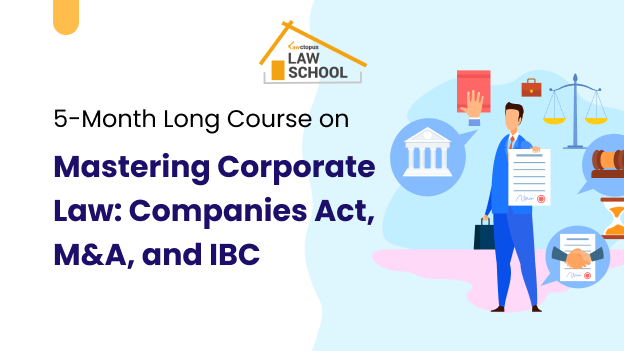About the Course
Corporate law is vast, and it can take years to figure out how it all fits together. This course cuts through the confusion and gives you a solid foundation quickly, clearly, and practically. Let’s make you job-ready for top law firms and in-house legal teams!
Month 1 and 2: We will start this course with Companies Law, where you’ll learn how companies are formed, governed, and dissolved. From incorporation, MOA, AOA, board meetings, and resolutions to NCLT procedures and winding-up, we will cover it all.
You’ll also gain hands-on experience in drafting essential legal documents like Employment agreements, NDAs, Shareholders’ Agreements, Share Purchase Agreements, etc.
Through practical assignments and real-world exercises, you will start drafting the kinds of documents and applications that show up on real desks in law firms and corporate offices.
Month 3 and 4: We will then move to Mergers & Acquisitions (M&A), where you will understand the full deal lifecycle including types of mergers, due diligence, execution of term sheets, key agreements like JV, Business Transfer Agreement, Asset Transfer Agreement, etc, nuances of private equity, venture capital, FEMA regime, SEBI regulations, etc.
You’ll also work on practical assignments like drafting a term sheet and take part in activities designed to simulate real M&A scenarios so that you can confidently step into the world of deal-making and transactional law.
Month 5: The course will then dive deep into the Insolvency and Bankruptcy Code (IBC), where you’ll learn the basics and the complete CIRP process, liquidation, cross-border insolvency, drafting NCLT applications, landmark judgments, recent amendments, etc.
Also, just like the other modules, you won’t just learn theory, you’ll work on practical assignments and activities such as drafting NCLT applications, preparing minutes of CoC meetings, and more, so that you are well-prepared to take on IBC work from day one.
To top it all off, you will also get an internship project from our partner corporate law firm, and upon completion, you will receive an Internship Project Certificate by the firm, giving your CV a strong boost!
In short, this is a maximum-benefit, power-packed course that gives you everything you need to become law firm ready!
Course Fee
Rs. 18,700/-
About Lawctopus Law School
Lawctopus Law School has taught a wide range of practical skills to over 20,000+ law students, young lawyers, professionals, academicians, and business people. Over 1000 students have rated our courses and the average rating is 93.2/100. Our online courses are ‘warm’ learning experiences!
At LLS, our courses are developed by subject matter experts (practitioners and academicians) and these courses are a mix of:
- Rigorously researched practical reading modules which compress years of real-life experience in a few pages
- Recorded lectures by Industry Experts which convey years of real-life experience in a few minutes
- Weekly live sessions which build upon modules and recorded lecture and clear of doubts
- Practical assignments which mirror real-life assignments
- Personal feedback to all learners so that you know where you are going right, where you are going wrong and can course correct
- Learn more through add-on modules and career webinars
- The now famous ‘rigour and care’ of LLS
Structure of this Course
The course begins with a live ‘Orientation Session,’ which explains how to fully benefit from it, and includes 30+ live sessions throughout!
Month 1 and 2: Company Law and Corporate Governance
Module 1: Basics of Company Law
- Incorporation of Companies
- Types of Companies and its legal framework
- Private limited vs. Public limited
- Section 8 company vs. Trust vs. Society
- Key provisions under the Companies Act, 2013 for startups
Module 2: Drafting of MOA and AOA
- Basics of MOA and AOA
- How to draft an MOA?
- How to draft an AOA?
Module 3: Prospectus and Securities Allotment
- Prospectus- Types of Prospectus & Preparation of Prospectus
- Legal Framework for Securities Issuance and Allotment
Module 4: Operations of a company
- Appointment of directors
- Roles and powers of Members, Shareholders, Promoters and Directors
- Directors’ report and Disqualification of directors
- How to draft an Employment Agreement?
Module 5: Governance of companies
- General Meetings
- Board Composition and Powers of the Board
- Board meetings and resolutions
- Notice, quorum, voting, minutes
Module 6: Investment and Debt
- What are debt, equity, and hybrid models?
- Debt v. equity financing
- FEMA Compliance
- FDI Regulations
- SEBI-related and sectoral filings
- How to draft and negotiate a Shareholders Agreement?
- Private investment in public equity transactions
Module 7: Capital Markets and Shares
- Shares and share capital
- Transfer of shares
- Buyback of shares
Module 8: Accounts and Auditors
- Preparation and filing of financial statements
- Role of auditors
- Audit committee and their responsibilities
- Auditor’s Report and CARO
Module 9: Corporate Social Responsibility
- What is CSR?
- CSR under the Companies Act, 2013
- Taxation on CSR activities
Module 10: NCLT and its procedures
- What is NCLT and what are its powers?
- Who can appear?
- How to draft a Petition before NCLT?
- Different kinds of petitions to be filed before NCLT
- Procedure followed in NCLT (start to end)
Module 11: Winding up of a Company
- What is winding up of a company?
- Voluntary winding up of companies
- Compulsory winding up of companies
Module 12: ESG Reporting and Corporate Ethics, Negotiations and Valuations
- Environmental, Social, and Governance (ESG) Reporting
- Key clauses in investment agreements
- Term sheet and cap table analysis
- Valuation methods and principles
- Role of ESG (Environmental, Social, and Governance) in corporate financing
Module 13: Startup Legal Framework
- Setting up a startup: Key legal considerations
- Startup India initiative and benefits
- Intellectual Property for startups
- Employee Stock Option Plans (ESOPs)
Module 14: Compliance and Risk Management
- Annual compliance checklist under the Companies Act
- Risk management framework for companies
- Compliance reporting and penalties
- Importance of internal audits and controls
Module 15: Employment Laws and Workforce Management
- Key employment laws applicable to companies
- Drafting employment and confidentiality agreements
- Handling workplace disputes and grievances
Assignment 1: Draft a Memorandum of Association for a fictitious company, with compliance notes on the Companies Act, 2013
Assignment 2: Draft a Petition to be filed before the NCLT based on the problem given.
Practical Presentation Activity
Month 3 and 4: Mergers and Acquisitions
Module 16: Fundamentals of Mergers and Acquisitions (M&A)
- Introduction to Mergers and Acquisitions
- Classification: Types of M&A
- Structuring the Deal: Choosing the Right Model
- Key Valuation Techniques
- Legal Ecosystem and Procedural Flow
- Overview of Competition Commission of India (CCI) Regulations and Guidelines
- Tax implications in M&A Scenario
- Tactics against hostile takeovers
Module 17: Who’s Who in an M&A Deal
- The acquirer and the acquiree, the integrator, the integrated: understanding founders, promoters, and directors
- Role of Investment Bankers, Business Brokers, Lawyers, and CAs
- Becoming the lawyer business people want
Module 18: Blueprint of a deal: From Agreement to Approval
- Term Sheet / Letter of Intent (LOI)
- Business Transfer Agreement (BTA) and Asset Transfer Agreement (ATA)
- Shareholders’ Agreement (SHA)
- Share Purchase and Share Subscription Agreement (SPSA)
Module 19 Section 230-240 of the Companies Act, 2013
Compromises, Arrangements, and Amalgamations
Module 20: Timeline and Phases in M&A Execution
- Strategic Planning and Target Evaluation
- Valuation of the Target Company
- Methods: Asset-based, Earnings-based, Market-based valuations.
Module 21: Understanding Due Diligence (DD)
- What is Due Diligence (DD) and why is it important
- Documents which require ‘due diligence’
- Studying a sample DD report
Module 22: Private Equity (PE) and Venture Capital (VC) in M&A
- Understanding PE/VC funding in M&A
- Structuring PE/VC investments
- Key documents in a typical PE/VC deal
- Stages where documentation plays a critical role
- Term Sheets and MoUs
- Share Subscription Agreements (SSA) and Shareholders’ Agreements (SHA)
- Key Clauses in PE/VC Contracts (Drag-Along and Tag-Along Rights, Liquidation Preferences, Anti-Dilution Protections [Full Ratchet, Weighted Average), Pre-emptive Rights and Right of First Refusal (ROFR)]
- Investor Rights and Protective Provisions
- Exit Strategies in Documentation
- Tax and Regulatory Clauses
Module 23: Peeling Back the Layers: Inside Due Diligence
- Core Sections of a Comprehensive Due Diligence Report
- Reviewing Key Documents (Board and shareholder meeting minutes, Material contracts: Leases, JVs, vendor/supplier agreements, Financing agreements, loan documents, charge filings, Insurance policies)
Module 24: Companies Act, 2013: Provisions Relevant to M&A
- Rules on Preferential Allotment and Share Transfers
- Legal Framework for Mergers under the Companies Act
- Share transfer: rules and procedures
- Deemed Public Companies
- Landmark case laws on the subject
Module 25: How to draft Important Agreements in M&A
- Key clauses in a Term Sheet and MOU
- Key clauses in a Shareholders Agreement (SHA)
- Important clauses in a Share Purchase and Share Subscription Agreement (SPSA)
- Key clauses in a Business Transfer Agreement (BTA) and Asset Transfer Agreement (ATA)
- Key clauses in a Joint Venture Agreement
- Negotiation of transaction documents in an M&A deal
Module 26: SEBI Regulations for Listed Companies
- Understanding the SEBI Takeover Code: Key triggers, open offer process, and disclosures
- Complying with SEBI LODR: Listing obligations, corporate governance, and reporting requirements
- Navigating SEBI ICDR: Practical steps for public issues, rights issues, and preferential allotments
- Delisting regulations: Voluntary and compulsory delisting in the context of M&A
- Insider trading concerns: Compliance with SEBI (Prohibition of Insider Trading) Regulations during deal negotiation and execution
Module 27: Crossing Frontiers: FEMA Compliance in Global M&A
- FDI and ODI regulations applicable to cross-border M&A under FEMA
- Automatic vs. Government approval routes for inbound and outbound investments
- Valuation norms and pricing guidelines for cross-border share transfers
- Regulatory filings: FC-GPR, FC-TRS, ODI Form, and Annual Performance Report
- FEMA implications of deal structures: share purchase, asset purchase, and share swaps
- Interaction of FEMA with Companies Act, Income Tax Act, and Competition Act in M&A deals
- Recent Updates and Case Studies [RBI circulars impacting cross-border M&A, Notable enforcement actions and compliance pitfalls, Key takeaways from real-life deal structures]
Module 28: E-commerce, Technology Law and Intellectual Property Rights
- Data protection and privacy regulations under the IT Act
- Intermediary liabilities and compliance norms
- Competition law considerations for digital platforms
- Importance of IPR for startups
- Trademark, copyright, and patent protection
- Licensing and franchising laws
Module 29: Special Purpose Vehicles (SPVs) in Deal-Making
- Purpose and Structure of SPVs
- Consortium Structures in Investment Deals
- Types of Investment Entities
- Understanding Exit Clauses
- Governance and Control Mechanisms
Module 30: Navigating Post-Merger Integration
- Why Integration Strategy is Critical
- Common Roadblocks in Merging Operations and Cultures
- Managing Disputes Post-Deal Closure
Module 31: Landmark M&A Deals in India
- International Trends Shaping M&A
- Complexities in Cross-Border M&A Transactions
- Political and Economic Influences on M&A Markets
- Case Studies of High-Profile M&A in India
Module 32: Ethics in Negotiations
- Maintaining Transparency and Honest Disclosures
- Role of Regulators
- Prevention of Insider Trading
- Ensuring Equitable Treatment of Stakeholders
- Promoting Social and Cultural Sensitivity in Business Combinations
Module 33: Careers in M&A
- Getting Started in M&A as a Law Student
- Strategic Guidance for Young Professionals (0–5 years)
- Recommended Tools, Platforms, and Resources for Staying Updated
Assignment 1: Draft an M&A Term Sheet focusing on conditions precedent and indemnity clauses.
Assignment 2: Detail the purpose and scope of the joint venture between fictitious companies in light of the contributions by each party, and governance structure.
Assignment 3: Prepare a Due Diligence Report
Practical Presentation Activity
Month 5: Insolvency and Bankruptcy Code
Module 30: Introduction to insolvency and bankruptcy law in India
- Meaning of insolvency and bankruptcy
- Law existing prior to IBC, 2016
- Introduction to the advent of IBC, 2016
- Formation of Insolvency and Bankruptcy Board of India (IBBI)
- Jurisdiction of NCLT
Module 31: Corporate insolvency resolution process (CIRP)
- Meaning, introduction and applicability
- Initiation of CIRP – Financial Creditor, Operational Creditor or by Corporate Debtor
- Step by step process and effects once CIRP commences
- Waterfall mechanism under Section 53 of IBC and concept of Committee of Creditors
- Concept of Interim Resolution Professional (IRP) and Resolution Professional (RP), rights, duties and powers of IRP and RP
- Concept of moratorium
- Prescribed timelines
- Resolution plan and persons eligible to submit resolution plans
- Pre-packaged insolvency resolution process
- Fast – track insolvency resolution process and its applicability
- Application for avoidance of different kinds of transactions by RP
- Insolvency resolution process of personal guarantors
Module 32: Liquidation and voluntary liquidation
- Meaning and introduction
- Initiation of liquidation and voluntary liquidation
- Appointment of liquidator
- Step by step process
- Prescribed timelines
Module 33: Cross-Border Insolvency
- Overview of cross-border insolvency under the IBC framework.
- UNCITRAL Model Law on Cross-Border Insolvency.
- Legal challenges and framework for recognition of foreign insolvency proceedings.
- Coordination Between Domestic and Foreign Courts.
- Group Insolvency in a Cross-Border Context.
Module 34. List of Landmark decisions on IBC, 2016
Some examples:
- Mobilox Innovations Pvt Ltd vs Kirusa Software Pvt Ltd
- Innoventive Industries Ltd vs ICICI Bank
- Pioneer Urban Land and Infrastructure Ltd v Union of India
- Swiss Ribbons vs Union of India
Module 35: Recent Amendments to the IBC, 2016
- Key highlights of the recent amendments.
- Impact of amendments on creditors and resolution applicants.
- Industry-specific insolvency provisions.
Module 36: Interplay of IBC with Other Laws
- Interaction of IBC with the Companies Act, 2013.
- Tax implications during insolvency and resolution.
- Interface of IBC with SEBI, FEMA, and labour laws.
- White Collar Crimes
- Judicial Perspectives on the Interplay of Laws.
Module 37: Economic Impact of IBC on Businesses
- Role of IBC in reviving stressed assets.
- Contribution of IBC to economic growth.
- Challenges faced by MSMEs under IBC.
Module 38: Emerging Trends and Issues in Insolvency
- Impact of technology in insolvency resolution (e.g., digital filings).
- ESG considerations in insolvency proceedings.
- Rising trends in distressed asset sales.
Short Reading Module 39: Personal Guarantors
Assignment 1: Draft an application to be filed under Section 7 of IBC, 2016 in the format prescribed under IBC, 2016.
Assignment 2: Analyze the role of a Resolution Plan for a fictitious company undergoing insolvency.
Practical Activity: Draft minutes of meeting of committee of creditors
Assignments in this Course
Months 1 and 2:
Assignment 1: Draft a Memorandum of Association for a fictitious company, with compliance notes on the Companies Act, 2013
Assignment 2: Draft a Petition to be filed before the NCLT based on the problem given.
Practical Presentation Activity
Months 3 and 4:
Assignment 3: Draft an M&A Term Sheet focusing on conditions precedent and indemnity clauses.
Assignment 4: Detail the purpose and scope of the joint venture between fictitious companies in light of the contributions by each party, and governance structure.
Assignment 5: Prepare a Due Diligence Report
Practical Presentation Activity
Month 5:
Assignment 6: Draft an application to be filed under Section 7 of IBC, 2016 in the format prescribed under IBC, 2016.
Assignment 7: Analyze the role of a Resolution Plan for a fictitious company undergoing insolvency.
Practical Activity: Draft minutes of meeting of committee of creditors
Click here to register for the 6-Month Long Training and Internship Program on ‘Mastering Corporate Law and Becoming Law Firm Ready’
8 Unique Elements of the Online Course
| First | Well-researched, practical & detailed reading resources |
| Second | Landmark judgment compilations and PPTs |
| Third | 35+ Live Sessions (on weekdays from 7 PM to 8:30 PM) and recordings of all the live sessions |
| Fourth | Recorded lectures by Industry Experts |
| Fifth | Double Benefit: Certificate from Lawctopus Law School + Partner Law Firm |
| Sixth | 6 Practical Assignments with personalised written feedback to each learner |
| Seventh | 3 practical drafting activity classes |
| Eighth | Discussion Portal for resolving your queries |
How will this course help you?
Accelerate Your Corporate Law Career in Just 6 Months!
- Law students will gain expertise in corporate law and become law-firm ready.
- All the learners will do a project with Ever Trust Legal, a renowned law firm, and earn a prestigious project certificate.
- Lawyers (0-4 Years of experience) can double their earning potential with enhanced practical skills.
- Build strong industry connections and generate more income.
- Learn from experienced law firm lawyers guiding you at every step.
- What takes lawyers 3-4 years to learn, you’ll master in just 6 months!
- Companies Act, M&A, FEMA, IBC, and more will taught in great detail!
Who can enroll for this course?
- Law students
- Law firm Associates
- Young lawyers wanting to excel in corporate field
- Company Secretaries
- Corporate Law Enthusiasts
- Academicians wanting to include the practical angle
Click here to register for the 6-Month Long Training and Internship Program on ‘Mastering Corporate Law and Becoming Law Firm Ready’
Course Developers and Faculty of this Course
1. Shashank Sardesai, Co-Founder EverTrust Legal, Company Secretary
- Founder, EverTrust Legal, a Pune based law firm
- Counsel, Serious Fraud Investigation Office (SFIO)
- Ex-Lawyer, HSA Advocates and Khaitan Legal Advocates
- Qualified Company Secretary professional
- Diploma in International Business Laws from Symbiosis Law School, Pune (2014)
Shashank Sardesai has a strong focus on corporate insolvency resolution processes, liquidation proceedings, and advising creditors and resolution professionals. He regularly handles complex IBC matters before the NCLT and NCLAT, making him well-versed in both procedural and substantive aspects of insolvency law.
2. Aayush Aggarwal, Partner C Cube Advisors, Company Secretary
- Partner, C Cube Advisors LLP
- Qualified Company Secretary
- LLM in Business Law
- Business networking expert
Aayush Aggarwal completed his LL.B. from Dr. B. R. Ambedkar University, Agra and LLM in Business Law from Kurukshetra University. He began his professional journey as an Associate at RRA Legal, where he built a strong foundation in corporate and tax law.
With a multidisciplinary background and a deep understanding of regulatory frameworks, Mr. Aggarwal is committed to helping businesses navigate complex legal challenges while ensuring full compliance with applicable laws. He currently runs his law firm which focusses on IP and General Corporate matters.
3. Shourya Sengupta, Partner, Khaitan & Co.
- Partner, Corporate and M&A Practice, Khaitan & Co.
- Ex-Associate, Amarchand Mangaldas & Suresh A Shroff & Co.
- NUJS Kolkata 2014 graduate (Ranked 4th in the University)
Shourya Sengupta specializes in strategic mergers and acquisitions (both domestic and cross-border), private equity investments, joint ventures, foreign collaborations, business transfer arrangements, corporate restructurings, and general corporate advisory. He has advised leading Indian and international clients across sectors such as manufacturing, healthcare and pharmaceuticals, fashion and retail, consumer goods, and financial services.
4. Gourav Mohanty, Independent Litigator, Ex Senior Associate, Shardul Amarchand Mangaldas
- Independent Litigator
- Ex Senior Associate, Shardul Amarchand Mangaldas & Co (SAM)
- Published in reputed journals of NLU Jodhpur and NALSAR Hyderabad, and has contributed articles to The Wire, IndiaCorpLaw
- Symbiosis Law School Pune graduate; DAAD Germany scholarship holder
Mr. Gourav Mohanty is an advocate primarily practicing in Bombay before the Hon’ble Bombay HC. Prior to this, he worked as a Senior Associate in the Dispute Resolution Team at SAM, where he advised and represented clients in high-stakes arbitration, insolvency, and regulatory matters.
He has published research papers in reputed journals of NLU-Jodhpur and NALSAR, and has contributed articles to The Wire, and IndiaCorpLaw. Gourav graduated from SLS, Pune in 2016. During law school, he was awarded the Gold Medal for Academic Excellence, and the DAAD-Germany Scholarship. He served as the Editor of the Symbiosis Law School Journal and was a decorated mooter.
5. Meghmala Mukherjee, Assistant Professor JGLS, BCL from Oxford University
- Assistant Dean; Fellow, Khaitan & Co. Centre for Business Law and Research, JGLS
- Ex Associate/Senior Associate: Verist Law; Shardul Amarchand Mangaldas & Co.; Lakshmikumaran and Sridharan
- BCL, University of Oxford
- NLU Odisha 2018 Graduate (Gold Medallist)
Ms. Meghmala Mukherjee is an Assistant Professor of Legal Practice at JGLS. Her primary focus areas are company law, corporate finance law, corporate governance and securities law. Before academia, she practised as a transaction and advisory lawyer across firms such as SAM and Verist Law.
She graduated from NLUO with 7 gold medals and received the university scholarship for 4 consecutive years. She has also read the BCL at the University of Oxford and was awarded the HSA Advocates Scholarship by the Oxford India Centre for Sustainable Development.
6. Jaibatruka Mohanta, Research Fellow, NLSIU Bangalore
- Research Fellow, CEERA, NLSIU Bangalore
- B.L.S. LL.B. from SVKM’s Pravin Gandhi College of Law, University of Mumbai
- Consultant, Lawctopus Law School
Mr. Mohanta began his professional journey as a Research Fellow at CEERA, NLSIU Bangalore, where he has been contributing to high-impact policy research and corporate litigation matters. His work spans regulatory and compliance issues, with a growing specialization in matters under the Companies Act and appearances before forums such as the NCLT.
Course Fee
Rs. 17,900 [Launching Price]
Add-on benefits
- Project Certificate from our partner corporate law firm
- Completion certificates are issued by Lawctopus Law School after completing the course.
- Merit certificates are awarded to best-performing learners.
- Access of webinars on contract drafting, contract lifecycle management, etc., are given for free
- Lifetime access of all course materials
- LLS alumni groups are available for exclusive internship/job notifications and discounts on courses/workshops.
Money Back Guarantee
In case you do the course sincerely and are still dissatisfied with it, we’ll refund you 100% of the money you invested; no questions asked. We are that confident in our course!
What does ‘sincerely’ mean? It means that you attend at least 75% of the live classes and complete the compulsory assignments successfully. If you still don’t think the course was worth the money, we’ll refund the full amount, no questions asked!
Just email us at [email protected] and the refund will be issued within 7-10 working days.
Questions?
If you have any queries regarding the course, please send an email to [email protected] and we will get back to you within 24 hours!





